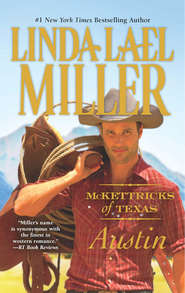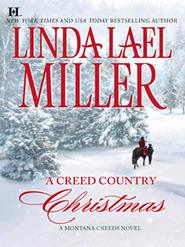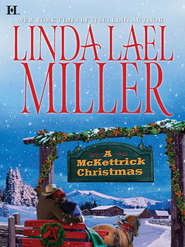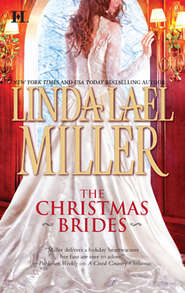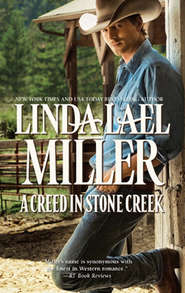По всем вопросам обращайтесь на: info@litportal.ru
(©) 2003-2024.
✖
The Marriage Pact
Автор
Год написания книги
2019
Настройки чтения
Размер шрифта
Высота строк
Поля
Home.
He’d had some misgivings about coming back here to stay—and Hadleigh’s reception couldn’t have been described as encouraging in any way, shape or form—but now, breathing in this place, like air, taking in the rugged terrain soul-deep, he knew he’d made the right decision.
Whether the going was easy or hard, this was where he belonged.
This, not the big city, was where he was most truly himself, where he was genuinely free.
The closer he got to the ranch, the more certain he was.
The home place, not so creatively called the Galloway Ranch, consisted of four hundred acres tucked away in one of the valleys folded into the otherwise craggy high country. They could take a newcomer by surprise, these flat, green expanses of rangeland, appearing out of nowhere at the rounding of a bend or the cresting of a hill.
The same old rural mailbox, rusted but sturdy, stenciled with the family name in weather-faded letters, stood like part of the landscape at the base of the drive, as it had for as long as Tripp could remember, listing slightly to the left.
“Fasten your seat belt,” he told Ridley as they crossed the cattle guard. “It’ll be a bumpy ride up to the house.”
The driveway, too fancy a name for what amounted to a glorified cow path, was fringed here and there with towering poplars, planted back in homestead days to serve as windbreaks. As rutted as ever, the dirt road was almost a mile long, twisting around boulders and a scattering of ancient pines, crossing the same creek twice, plunging into shallow gullies and then rising again.
Ridley seemed unfazed by all the jostling; he looked eagerly out at the sprawling rangeland all around them, haunches quivering with anticipation whenever a rabbit or a flock of quail skittered across up ahead.
The barn, big and red and much in need of a paint job, came into view first, then the log house, with its wraparound porch and gray shingled roof.
The front door opened and Jim stepped out, not quite as tall as the last time Tripp had seen him, significantly thinner and a little stooped in the shoulders.
And his hair, though still thick, had gone almost white.
For all that, a broad smile brightened Jim’s weathered face. He stayed where he was, instead of striding out to meet Tripp the way he always had before, leaning against one of the thick pillars that supported the porch roof and raising one hand in greeting.
Tripp’s heart squeezed at the sight of the only father he’d ever known, the man who hadn’t just raised somebody else’s son as his own, but had loved that boy’s mother with the kind of quiet, steadfast devotion most women probably only read about in books or saw in movies.
Jim had never been a rich man, but he couldn’t have been called poor, either. He worked long and hard, raising some of the finest cattle and horses in Bliss County, and he’d provided well for his wife and son. In good weather, he’d found time to take Tripp fishing and camping, taught him to ride and rope, shoot and drive the tractor. During the harsh Wyoming winters, when the land lay virtually bared to the bitter winds and snow gathered in drifts so high the fences were just shallow gray lines etched into glistening white, Jim had been the one to roll, uncomplaining, from a warm bed, haul on socks and boots and cross over icy floors to relight the temperamental old furnace in the basement, then come back up to the kitchen to start the coffee brewing and light the fire in the potbellied stove.
He’d always managed to get the truck running, no matter how low the temperature might have plunged during the night, good-humored even as fresh snow weighted the brim of his hat and slipped under the collar of his sheepskin-lined coat, so chilly it burned against bed-warmed flesh.
Some men talked a good game, when it came to things like love and integrity, hard work and persistence, common decency and courage in the face of all kinds of adversity. Jim Galloway, never one to “run off at the mouth,” as he put it, quietly lived all those stellar qualities and then some.
Now, studying his dad from behind the windshield of that fancy truck, Tripp gulped hard, figuring he’d better get a grip here if he didn’t want to make a damn fool of himself. Resolved, he shut off the engine, shoved open the driver’s-side door and got out. Ridley didn’t stand on ceremony; he scrambled across the gearshift and the cushy leather seat and leaped to the ground, where he proceeded to bound around in happy circles.
Jim chuckled at the dog’s antics, then fixed his gaze on Tripp’s face, turning solemn. Beyond a slight shift of his weight, he didn’t move, but remained where he was, with one shoulder braced against that pole on the porch. He seemed to lean in, as though he wasn’t sure he could stand on his own.
Grim certainty clenched the pit of Tripp’s stomach as he opened the front gate and approached. When they’d spoken over the phone a few days before, Jim had admitted he needed help but not much more than that. Now, in this moment, Tripp knew he’d been right to worry.
Something was wrong. Really wrong.
Ridley, having followed Tripp through the gate, commenced galloping in circles again, celebrating this new liberty.
Tripp kept the grin plastered to his mouth as he reached the porch steps, climbed them, ready to offer the customary handshake.
Instead, Jim put an arm around Tripp and held him close for a long moment before recovering enough to summon up another smile—probably no more genuine than Tripp’s—and to clear his throat. Jim’s pale blue eyes were watery when he clasped Tripp’s shoulder, held him away a little and muttered. “Let me look at you, boy.”
Tripp couldn’t sustain the fake grin any longer; it had already hardened into a grimace, so he let it fall away, like a handful of pebbles clattering down the face of a cliff. “What’s the story, Dad?” he demanded quietly. “And don’t give me any of that John Wayne, man-of-few-words bullshit, either. Tell me what’s wrong.”
Jim sighed and pushed away from the pole to stand up straight. He swayed almost imperceptibly, and his hold on Tripp’s shoulder briefly tightened.
“I reckon you have a right to know,” he allowed after a long time spent pondering. He gestured toward the gaping front door. “But we’re letting the flies in, standing out here like this, and, besides, I’d just as soon have this conversation inside the house, with a cup of hot coffee in front of me—if it’s all the same to you.”
Tripp nodded tersely, willing to accept that much of a delay and no more, and wisely but barely refrained from taking hold of Jim’s arm and ushering him over the threshold.
Pausing just inside, he whistled for Ridley, who ignored him completely, busy checking out one of the flower beds now.
“Let the poor critter be,” Jim said in a kindly rasp. “He needs to breathe some fresh air and stretch his legs a bit.”
Tripp hesitated, walking close behind his stepfather, ready to catch him if he stumbled. “But he could run off or something...”
Jim, shuffling across the worn plank floors of the living room now, didn’t look back. “He’ll be fine,” he replied. He gave another scratchy chuckle. “This isn’t the big city, son. If he runs off, he’ll come back. Anyhow, there’s not much traffic on the county road, let alone way out here, so it’s not as if he’s fixing to get himself run over by a garbage truck or one of those taxicabs.”
In spite of what he’d guessed, and the dread of all he still didn’t know, Tripp laughed, a short, hoarse bark of a sound. “No, sir,” he countered. “This country’s as safe as a Sunday-school picnic—if you don’t mind a few wolves, coyotes, rattlesnakes and grizzly bears.”
Jim shook his head, passing through the archway and into the dining room. “Been too long since you set foot on plain ol’ dirt,” he observed drily. “Living in Seattle all those years, surrounded by nothing but concrete and asphalt, why, it’s done something to your brain. Made a worrywart out of you.”
Tripp smiled—this time for real. To Jim’s way of thinking, any community with a population over ten thousand was too big for its own good.
Therefore, he didn’t bother to make a case for Seattle. Jim would only sigh and shake his head again. What Tripp did say was, “The point is, I’m back to stay.”
Jim paused in the open doorway to the kitchen, gripped the framework with one hand to steady himself, take a moment’s rest. “It’s about damn time, too,” he grumbled good-naturedly, squaring his bony shoulders and then, with a little too much effort, moving forward again.
Tripp was relieved when his stepfather finally made it to the kitchen, crossed to the table and pulled out a chair to sit down.
“I’ll get you that coffee,” Tripp said lightly. “In the meantime, start talking.”
Chapter Three
JIM TOOK A while to catch his breath. He was pale under that perennial outdoorsman’s suntan of his, and he closed his eyes for a second, summoning strength. When he opened them again, he looked at Tripp with a kind of weary directness.
“I’ve been sick,” he finally confided. “That’s the long and the short of it.”
Tripp, in the process of filling the carafe from the coffeemaker at the sink, froze; his throat went tight as a cinch strap that’d been yanked hard around a horse’s belly and buckled to the last notch. “What kind of ‘sick’?” he asked when he was halfway certain he could speak without stumbling over every word.
His biological father, who’d died after a routine appendectomy when Tripp was still a newborn, was an unknown quantity, a story his mother told, an unfamiliar image in old snapshots.
Jim Galloway was his dad.
Jim sighed once more. “Not the dyin’ kind, so don’t go writing up my obituary and looking for places to scatter the ashes,” he said in his slow and thoughtful way. “I’ll be around awhile, most likely.”
Tripp’s jawbones locked at the hinges. “Most likely? What the hell is that supposed to mean?”
Jim, watching Tripp with a mixture of compassion and amusement in his eyes, dredged up a raw chuckle that sounded like it must have hurt some on its way out.
“Everybody has to die sometime, son,” he said hoarsely. “No sense getting all knotted up over something that can’t be helped.”






